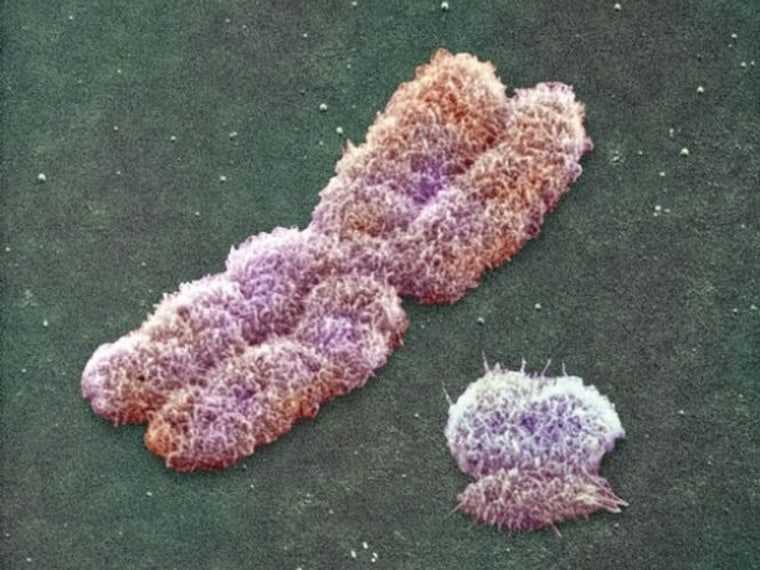Scientists say an African-American male's odd genetic signature suggests that the human Y chromosome's lineage goes back further in time than they thought — perhaps due to interbreeding with other populations such as Neanderthals.
"This really upsets a lot of ideas, but at the same time, it's understandable if we accept that human populations were structured in the past so that there were little pockets of diversity," said Michael Hammer, an evolutionary biologist at the University of Arizona who is one of the authors of a study published in the American Journal of Human Genetics.
The study focuses on the analysis of a DNA sample that was obtained from an African-American living in South Carolina and submitted to the Genographic Project, a National Geographic effort aimed at mapping human origins and migration. The funny thing about this sample is that it didn't match up with any of the previously known genetic signatures for the Y chromosome, which is passed down from father to son.
"Nobody expected to find anything like this," Hammer said in a news release.
A team led by Fernando Mendez, a researcher in Hammer's lab, analyzed more than 240,000 DNA base pairs on the African-American's Y chromosome. A comparison of the differences between the mystery genetic signature and previously known signatures led the team to conclude that the most recent common ancestor for the entire group lived about 338,000 years ago.
That goes further back than the fossil record goes for anatomically modern humans, Hammer said. "The fossil record speaks to 195,000 years or 200,000 years," he said. It also goes further back than the previous date for the most recent common ancestor based on Y-chromosome analysis, which is in the range of 142,000 years.
The researchers followed up on their discovery by searching through a genetic database for African populations, and turned up 11 men from western Cameroon who had virtually the same genetic signature.
Hammer said there could be two explanations for the previously unidentified Y-chromosome type: Either the genetic heritage of anatomically correct humans really does go back much further than what's reflected in the fossil record — or other populations, such as Neanderthals or the more recently identified Denisovans, interbred with modern humans. Anthropologists refer to that pattern of divergence followed by renewed interbreeding as introgression.
The results are "more consistent with introgression of an odd lineage," Hammer told NBC News. Over the past few years, scientists have been coming around to the view that such interbreeding did take place early in the history of our species. Recent analysis of Neanderthal and Denisovan DNA has indicated that a part of their genetic heritage survives in modern-day humans.
Melissa Wilson Sayres, a geneticist at the University of California at Berkeley who played no role in Hammer's study, said the new findings were "exciting" because they pointed to a Y-chromosome lineage more ancient than any others. "They just happened to come across this one Y chromosome that was hidden for so long, and it's very likely that there are more hidden Y chromosomes around the world," she told NBC News.
She said one of the biggest debates in the study of human genetics has to do with how to match mutation rates with time scales — and she expects this latest study to add to the debate. For example, some might continue to argue that the most recent common ancestor lived more recently than 338,000 years ago. "It will still be the oldest Y-chromosome heritage that we have, but I can foresee that some people might disagree with that specific age," she said.
More about our genetic origins:
- Y chromosome is an evolutionary marvel
- Humans had sex with now-extinct relatives
- So who didn't have sex with Neanderthals?
In addition to Hammer and Mendez, the authors of "An African American Paternal Lineage Adds an Extremely Ancient Root to the Human Y Chromosome Phylogenetic Tree" include Thomas Krahn, Bonnie Schrack, Astrid-Maria Krahn, Krishna R. Veeramah, August E. Woerner, Forka Leypey Mathew Fomine, Neil Bradman, Mark G. Thomas and Tatiana M. Karafet. The authors acknowledged Jacqueline Johnson and her male cousins, the descendants of Albert Perry (South Carolina) and participating Family Tree DNA customers.
Alan Boyle is NBCNews.com's science editor. Connect with the Cosmic Log community by "liking" the log's Facebook page, following @b0yle on Twitter and adding the Cosmic Log page to your Google+ presence. To keep up with Cosmic Log as well as NBCNews.com's other stories about science and space, sign up for the Tech & Science newsletter, delivered to your email in-box every weekday. You can also check out "The Case for Pluto," my book about the controversial dwarf planet and the search for new worlds.
